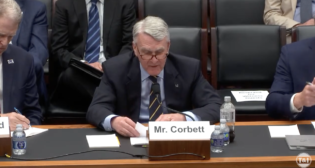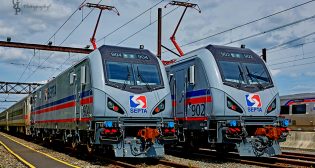
USDOT Officials Ride New Caltrain EMU
Written by Marybeth Luczak, Executive EditorRepresentatives from the U.S. Department of Transportation recently had a test ride of Caltrain’s Stadler-built KISS EMU (electric multiple-unit), which is now in the final stages of testing at Transportation Technology Center, Inc. in Pueblo, Colo.
USDOT Deputy General Counsel John Putnam joined Cindy Terwilliger, Federal Transit Administration Region 8 Regional Administrator; Michelle Bouchard, acting Executive Director of Caltrain; Martin Ritter, CEO of Stadler US; Kari Gonzales, President and CEO of TTCI; and other industry professionals for the Nov. 5 event. Caltrain and Stadler also gave a presentation on the Peninsula Corridor Electrification Project (PCEP), which is upgrading and electrifying Caltrain’s 51-mile doubletrack commuter rail system from the 4th and King Caltrain Station in San Francisco, Calif., to the Tamien Station in San Jose, Calif.
Trainset No. 1 arrived at TTCI earlier this year to undergo a comprehensive set of instrumented operational tests, at velocities exceeding maximum operating speed, on the AC-catenary-electrified RTT (Railroad Test Track), which is capable of supporting speeds up to 170 mph.
Stadler is building 19 seven-car trainsets for the Caltrain project. Assembly is taking place at its Salt Lake City, Utah, manufacturing plant.
“These new electric trains will bring a new standard of excellence to the Caltrain corridor,” said Caltrain’s Bouchard. “Cleaner, greener, quieter, more comfortable, and more efficient, these trains will deliver an across-the-board improved riding experience with features such as Wi-Fi, improved passenger information displays, additional storage, and power sources at every seat, benefiting the communities we serve for decades to come.”



